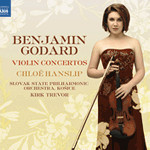
Godard: Violin Concerto No. 2 / Concerto Romantique / Scenes Poetiques
 $25.00
Low Stock
add to cart
$25.00
Low Stock
add to cart
BENJAMIN GODARD
Godard: Violin Concerto No. 2 / Concerto Romantique / Scenes Poetiques
Chloe Hanslip (violin) / Slovak State Philharmonic Orchestra, Kosice / Kirk Trevor
[ Naxos / CD ]
Release Date: Thursday 14 February 2008
Should this item be out of stock at the time of your order, we would expect to be able to supply it to you within 4 - 7 business days.
"Praise for Chloë Hanslip's confident excursion into unfamiliar territory." Editor's Choice Gramophone Magazine (April 2008)
MARBECKS STAFF PICK - BEST RECORDINGS 2008
"Praise for Chloë Hanslip's confident excursion into unfamiliar territory."
Editor's Choice Gramophone Magazine (April 2008)
"Outstanding…. a very special violinist. Hanslip's sound is sensual, vocal and yearning, and totally radiant in its top register…she is likely to become the greatest violinist of her generation." Limelight
Benjamin Louis Paul Godard, the son of a businessman, was born in Paris on 18th August, 1849. A child prodigy on the violin, Godard studied with Richard Hammer and later Henri Vieuxtemps. At the age of fourteen (some sources say when he was ten) Godard was admitted to the Paris Conservatoire and studied composition under Henri Reber. His first published work was a violin sonata written when he was sixteen. In the mid-1860s he twice competed unsuccessfully for the Prix de Rome. From this time forward Godard dedicated himself to composition, first writing chamber music (he played viola in several chamber music societies), and numerous piano pieces. He was especially inspired by the music of Robert Schumann, and orchestrated Schumann's Kinderscenen in 1876. In 1878 his Le Tasse was a joint winner of the prize for musical composition given by the city of Paris. Le Tasse is a three-part dramatic symphony with soli and chorus based on a poem of Charles Grandmougins, which was in turn based on The Damnation of Faust. In succeeding years Godard composed an enormous amount of music, including three programme symphonies (Symphonie Gothique, Symphonie Orientale, and Symphonie Légendaire), three string quartets, four violin sonatas, a cello sonata, two piano trios, numerous piano pieces, violin and piano concertos, various orchestral works, and over a hundred songs. Godard is chiefly remembered for his operas. His first opera, Les bijoux de Jeanette, was produced in 1878; Pedro de Zalamea followed in 1884. His next opera, Jocelyn, based on a poem of Lamartine, appeared in 1888. Its fame rests mainly on the well-known Berceuse, which has been arranged for numerous combinations of instruments and/or voices and remains Godard's most familiar work. It has been performed by Jussi Björling, John McCormack (in English translation as "Angels Guard Thee" and with the violin accompaniment of Fritz Kreisler), Alma Gluck, Pablo Casals, the Eroica Trio, and many others. Godard's operatic output also included Dante et Béatrice (1890), Jeanne d'Arc (1891), and La Vivandière (1895; unfinished at his death and completed by Paul Vidal). The conductor Jules Étienne Pasdeloup admired Godard's music and allowed Godard to conduct many of his own premières. After Pasdeloup's retirement, Godard created theConcerts Modernes in an attempt to continue Pasdeloup's Concerts Populaires , but this lasted only one season (October 1885 - April 1886). In 1887 he was appointed a professor at the Paris Conservatoire, and in 1889 was made a Chevalier of the Légion d'honneur. Godard died of tuberculosis at Cannes on 10th January, 1895.
NOTE: Cover may differ from that shown
Tracks:
Concerto No. 2 for Violin and Orchestra, Op. 131
Concerto Romantique for Violin and Orchestra, Op. 35
Scènes Poétiques for Orchestra, Op. 46



